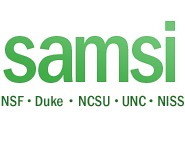Astrostatistics - September 19-21, 2012
Workshop Information
This three day workshop, held at SAMSI, brought together astrophysicists and statisticians to brainstorm on advanced topics in statistical inference in the context of modern empirical astrophysics.
The importance of rigorous application of statistical methods to astrophysical data analysis has increased enormously in the last two decades. There has been a paradigm shift that involves constantly dealing with large data sets at multiple wavelengths, which requires complex automated processes that necessitate a diverse set of sophisticated statistical techniques. The current and upcoming astrophysics missions such as the SDSS, Planck, LSST and LIGO continue this trend to even larger data sets and parameter sets. The workshop brought together astrophysicists from diverse sub-disciplines who have used statistical analysis in their research, and statisticians who have experience with statistical issues in astrophysics, in order to create a forum for extensive interactions on state-of-the-art statistical inference as applicable to astrophysical problems.
List of astronomy topics:
* Transients in Astrophysics: the search for transients, search for periodicities
* Large sky surveys, Dark Energy Survey
* Cosmic Microwave Background studies
* Galaxy Evolution
* Exoplanets
* Current missions (Fermi, SDSS, DES, Planck)
* Future missions (LSST, LIGO)
List of topics on improved statistical inference:
* Non-Linear Data Transformation
* Sparsity
* Data Mining
* Bayesian Methods
Schedule
Wednesday, September 19, 2012
at SAMSI
Room 150
| 8:45-9:15 a.m. | Registration and Continental Breakfast |
| 9:15-9:30 | Welcome and Introduction Prajval Shastri, Stanford, and G. Jogesh Babu, Pennsylvania State University |
| 9:30-10:30 | Bayesian Statistics Overview Jim Berger, Duke University |
| 10:30-11:00 | Break |
| 11:00-11:30 | Astronomical Image Analysis Employing Bayesian Mixture Models Fabrizia Guglielmetti, Max-Planck Institute |
| 11:30-12:00 | Bayesian Hierarchical Modeling of Supernovae Type Ia Roberto Trotta, Imperial College-London |
| 12:00-12:30 | Searches for Gravitational Waves with the Ground-based Interferometers Sergey Klimenko, University of Florida |
| 12:30-2:30 | Lunch |
| 2:30-3:30 | "Big Data" Issues from a Bayesian Perspective Tom Loredo, Cornell University |
| 3:30-4:00 | Break |
| 4:00-4:30 | Detecting Faint Intermittent Sources in Large Datasets Ashish Mahabal, California Institute of Technology |
| 4:30-5:00 | Lessons Learned from Automated Analyses of 36,000,000 Light Curves Hakeem Oluseyi, Florida Institute of Technology |
| 5:00-5:30 | Bayesian Methods in High Energy Astrophysics Aneta Siemiginowska, Harvard-Smithsonian Center for Astrophysics |
Thursday, September 20, 2012
at SAMSI
Room 150
| 8:30-9:00 a.m. | Registration and Continental Breakfast |
| 9:00-10:00 | Learning from Big Data in Astronomy - Overview Kirk Borne, George Mason University |
| 10:00-10:30 | Break |
| 10:30-11:00 | The DES and LSST Surveys: Extracting Information from Galaxy Images Bhuvnesh Jain, University of Pennsylvania |
| 11:00-11:30 | Multivariate Techniques in Star and Galaxy Identification Deborah Bard, Stanford University |
| 11:30-12:00 | Weighing Galaxies using Inference from Cosmological Simulations Risa Wechsler, Stanford University |
| 12:00-2:00 | Lunch |
| 2:00-3:00 | Sparsity – Overview David Donoho, Stanford University |
| 3:00-3:30 | Break |
| 3:30-4:30 | Sparsity and Cosmic Microwave Background Analysis Jean-Luc Starck, Laboratoire Astrophysique |
| 4:30-5:00 | Discussion: Research Working Group Topics |
| 5:00-6:30 | Reception and Poster Session SAMSI will provide poster presentation boards and tape. The board dimensions are 4 ft. wide by 3 ft. high. They are tri-fold with each side being 1 ft. wide and the center 2 ft. wide. Please make sure your poster fits the board. The boards can accommodate up to 16 pages of paper measuring 8.5 inches by 11 inches. |
Friday, September 21, 2012
at SAMSI
Room 150
| 8:30-9:00 a.m. | Registration and Continental Breakfast |
| 9:00-10:00 | Improved Estimation for Astrophysical Problems Via Nonlinear Transformation and Adaptive Bases Ann Lee, Carnegie-Mellon University |
| 10:00-10:30 | Break |
| 10:30-11:00 | Analyzing Astronomical Data Sets Using Non-linear Random Effects Models Brandon Kelly, Univ. of California-Berkeley |
| 11:00-11:30 | Bayes at the Frontier: The Promise and the Challenges Harrison Prosper, Florida State University |
| 11:30-12:00 | Searching and Characterizing Small Transiting Planets using NASA's Kepler Mission Eric Ford, University of Florida |
| 12:00-2:00 | Lunch |
| 2:00-2:30 | Automating Science in the Time-Domain Survey Era: Machine- Learning Challenges Joshua Bloom, Univ. of California-Berkeley |
| 2:30-3:00 | Advances in Discovery and Classification for Time-Domain Astronomy Joseph Richards, Univ. of California-Berkeley |
| 3:00-3:30 | Break |
| 3:30-5:00 | Panel Discussion on Future Directions |
| 5:00 | Conclusion and Adjourn |
